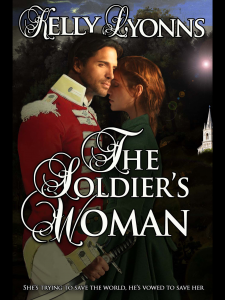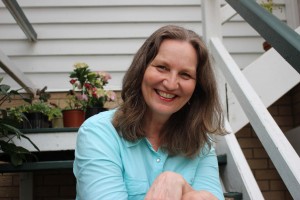Welcome to Sunday Spotlight, a new series of author Q&As. Today we feature Kelly Lyonns, whose debut novel, The Soldier’s Woman, was released on February 9th.
Q: When did you start writing and what was the catalyst?
A: I’ve always written things but I didn’t consider creative writing as a serious endeavour until I joined my writing group in 2010. The group was formed after a library author talk on Valentine’s Day in 2010.
Q: How many novels have you written and published?
A: The Soldier’s Woman is my debut novel.
Q: How long on average does it take you to write a book?
A: This one took 5 years to write.
Q: How has being Australian AND a woman impacted on your writing and/or writing career?
A: Markets for writing in Australia are very few on the ground compared to UK or USA for example. The number of competitions and opportunities simply aren’t here. As a female writer it is almost expected that I should write romance. Although I love the genre I am hoping to complete and publish my paranormal and science fiction novels also. Writing in the romance genre I have found a very supportive community out there, which is diametrically opposed to the competitive nature of freelancing as an environmental scientist (specialising in writing and editing).
Q: What authors and types of books do you love the most?
A: I love many genres: action, crime, non-fiction, romance, fantasy, science fiction. Some of my favourite authors include Stephanie Laurens, Mary Jo Putney, Alain de Botton, Clive Cussler, Bill Bryson, Jayne Ann Krentz.
Q: What is your favourite childhood book? Did reading as a child have any bearing on your decision to become a writer?
A: I had two which I read until they fell apart – Black Beauty and Call of the Wild. Don’t ask why those two I don’t know. Maybe because the central figures were animals. I don’t know if they influenced my writing but I drew endless pictures of horses (giant surprise) as a girl and wolves (which were what I imagined Buck looked like).
Q: What inspired your most recent book?
A: I loved the regency romances as soon as I read my first one. Of course I saw Pride and Prejudice on TV before I read all of Jane Austen’s novels. Then I saw Sharpe, and read Bernard Cornwall’s novels. I knew that my hero and heroine would be somewhere on the Napoleonic battlefield. And as I always say … Mr Darcy … just Mr Darcy… sigh.
Q: How much research do you do? As an author of Historical Fiction, how do you balance the demands of getting the facts right and telling a good story?
A: I spent a ridiculously long time Googling and reading about historical battles, customs of the countries, appropriate clothing, typical foods of the day etc. I play around with historical accuracy (as far as I know) when plotting. I write the scenes with those restrictions in mind. Of course sometimes the plot demands that something historically inaccurate or unusual has to happen. In those cases it is history that gets tweaked – but not too much. Regency romance readers are as discerning as re-enactors and as informed as history professors.
Q: Do you read your book reviews? Do you appreciate reader feedback and take it on board, even if it is negative? How do you deal with negative feedback after spending so much time writing your book?
A: I do read reviews – usually after making myself a cup of tea first. I consider what readers say very carefully. One of the joys of belonging to a good writing group is the critiquing. Good feedback, whether positive or negative, makes good writing. Of course, it is also important to allow for different people’s tastes. It’s always good to have reviews and critiques from people who know and like the genre you are writing in. Negative feedback that falls outside of this is best viewed through the lens of the balance of comments. In these cases I read but don’t dwell.
Q: How much planning do you do? Do you plan / plot the entire story from beginning to end, or let it evolve naturally as the writing progresses? In terms of characters, are they already a firm picture in your mind before you start writing or do they develop a personality of their own as the story progresses?
A: I begin with a rough idea and basically dot points. Sometimes scenes develop in my mind fully formed. I begin to have a detailed chapter outline and timeline somewhere around the first 10,000 words – maybe. I plot the main story and then each of the sub-plots. Checking to see how they intertwine. The characters are varied, some are strong and quite clear right from the start, others pop into the story full formed (which is always quite surprising to me) and other are there as pale cyphers until I drag them out of the shadows. I write a lot of dialogue which never makes it into the book, just to get to know the characters. A little like a script. The story then becomes directed by the characters and their natural reactions to situations that I create.
Q: Have you ever had to deal with a situation where someone feels they recognise traits of themselves in one of your characters?
A: Not so far.
Q: Can you tell us something about yourself that not many people would know?
A: I absolutely fear and loathe grasshoppers, and find octopus the most sublime amazing creations on the planet (but I don’t want one as a pet).
Q: If you could go back in time for a year, which historical era would you choose to live in?
A: I’m actually very fond of my modern comforts such as refrigeration and aspirin. I would like to specify that I would not like to go back in time as anything less than upper class, but it would have to be the late Victorian era (despite the dresses) when invention and science were just starting to change the world.
Q: If you could sit down for an afternoon with an iconic person from history, who would you choose to spend that time with?
A: I’m not sure, perhaps Catherine the Great Empress of all the Russians, or Prince Albert of Saxe-Coburg and Gotha (later Queen Victoria’s consort).
Q: When did you discover the Australian Women Writers Challenge?
A: Late 2016
Q: Do you think the challenge has had any impact on the awareness and discoverability of Australian Women writers?
A: I would have thought so, certainly compared to having no challenge at all.
Q: Have you personally benefited in terms of exposure of your work to new readers?
A: Not to date, but it early days yet.
About The Soldier’s Woman: 
There really were times when being a petite well-bred lady was positively tedious.
Charlotte Everslea, dedicated paranormal artefact hunter, was in need of a little help to retrieve a dangerously powerful book. Not to mention, to rescue some children, thwart a Machiavellian nemesis and evade Napoleon’s Portuguese army. What she didn’t need was an unbiddable overprotective stormy-eyed Redcoat, even if he was sent by fate.
Being both a gentleman and a soldier was sometimes most inconvenient.
Colonel Maximilian Bladewood was used to giving orders and having them obeyed both on and off the battlefield. But the petite golden-haired hoyden, to whose accidental intervention he owed his life, challenged both his authority and his sanity. Regardless, his duty was clear. Even if it included protecting a stubbornly obsessed innocent from the dangers of a war.
Cross-purposed and with the civilised world at stake, fate throws down another challenge – hope for love. All it will cost them are the vows they have each sworn to keep.
I thoroughly enjoyed The Soldier’s Woman by Aussie author Kelly Lyonns (which is book 1 in The Bladewood Legacy) – it’s hard to believe it’s the author’s debut! Brenda – Goodreads
About Theresa: I am an avid reader and book collector with a particular interest in Australian colonial history, circus life during the Great Depression, and the World War II era – an eclectic mix! I write Australian contemporary fiction and have four novels published, with another one to be released in this year, although I am making the switch with my sixth novel into Historical fiction with a dual timeline. You can find me on Facebook Theresa Smith Writes and Goodreads Theresa Smith







Congrats on your debut.
Thank you Georgia.